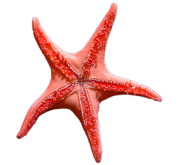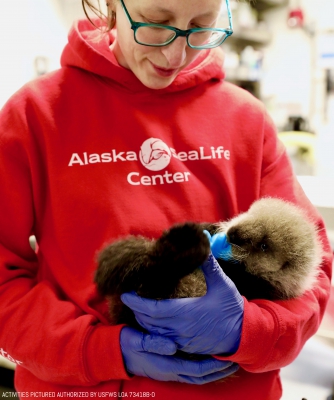Alaska SeaLife Center Admits First Animal of 2019 April 25, 2019
Seward, Alaska (April 23, 2019) – A newborn female sea otter pup was admitted to the Alaska SeaLife Center (ASLC) on April 9.
After observing the sea otter pup floating alone in Kachemak Bay, concerned fishermen contacted ASLC. Volunteers based in Homer transported the pup to the Center after receiving permission from U.S. Fish and Wildlife Service. When the pup arrived at ASLC, the staff were surprised to see a fleshy umbilical cord, indicating she could be around a day old. It is not unusual for the ASLC to treat very young sea otter pups, but one that could be a day old or less is rare. “About ten percent of the sea otters admitted to the Center are younger than a week old, but only a few are about a day old,” states Director of Animal Health, Dr. Carrie Goertz.
This young 3-pound pup is now under 24-hour care. Since the pup is so young, ASLC animal care specialists used various methods to teach her how to suckle from a bottle. “Usually the young pups catch on pretty quick, but it can take them a few days,” states Jane Belovarac, Wildlife Response Curator. ASLC staff started with syringe feeding so they could control the amount of formula the sea otter received. Now the pup is taking formula from a bottle and is being fed every 2 hours.
The Alaska SeaLife Center is a 501(c)(3) not-for-profit organization and the only permitted marine mammal rehabilitation center in Alaska. Over 80% of the funding for ASLC’s Wildlife Response Program comes from charitable donations. The Center is thankful for organizations like SeaWorld & Busch Gardens Conservation Fund, BP Alaska, ConocoPhillips Alaska, GCI and PetZoo whose generous support helps ASLC care for marine mammals like sea otters.
Since the Alaska SeaLife Center responds to 33,904 miles of coastline, stranding partners and civilians are critical in assisting the Center with wildlife response calls. When an animal is in distress the first reaction is often to tend to it. This can be a mistake as it is sometimes difficult to distinguish distress from normal behavior. Sea otters leave their young in what they perceive to be a safe place while they forage for food. If people or pets are nearby when they return they are likely to abandon their young.
Marine mammals have been safeguarded by the Marine Mammal Protection Act since 1972, so any disturbance to them is illegal without permission from the correct government authorities. If a sick or injured animal is encountered, ASLC staff urge people to call first, observe at a safe distance, respect the animal’s territory, and keep pets and children away. ASLC operates a 24-hour stranding hotline where trained professionals will walk people through the proper steps to assist the animal. Call 1-888-774-SEAL if you see a marine mammal in distress.


